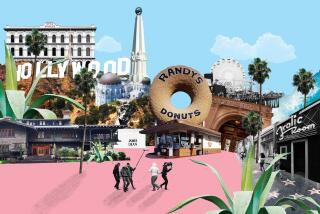W.C. Fields Perfected Persona in Valley
- Share via
One of Hollywood’s legendary stars, W.C. Fields, almost invariably played an untrustworthy, misanthropic, alcoholic braggart. Many people believe he was merely playing himself--a screen character he perfected while living in the Valley.
Fields was born in Philadelphia in 1879, ran away from home at 11, and by 15 was working as a full-time juggler for $5 a week. By 1915, he was starring in the Ziegfeld Follies, placing him among the leading stars of the Broadway stage.
In 1932, he left New York for Hollywood, moving into a mansion at 4704 White Oak Ave., Encino. He lived there while making many of his classics, including “The Barber Shop,” “The Pharmacist” and “The Fatal Glass of Beer.”
In her book “W.C. Fields and Me,” his mistress, Carlotta Monti, recounted driving along Ventura Boulevard on her first visit to his home in 1932:
“Real grass was still visible, the coming of commerce hadn’t yet threatened its extinction, nor had the birth of smog filtered out the vivid coloring. We reached Encino, turned on White Oak Avenue--a street of large estates. . . . I could see a beautiful, secluded Spanish home [with] a tennis court, swimming pool and aviary. The ranch grounds must have covered five acres.”
By 1938, Fields had moved briefly to Bel-Air, but within a few years was occupying an estate at 2015 De Mille Drive, Los Feliz.
The Los Feliz estate remained Fields’ home until ill health caused by liver failure forced him to move to the Las Encinitas Sanitarium in Pasadena. There, Fields died on Christmas Day 1946.
His heirs fought in court for several years over his will, which included substantial liquid assets--a vast collection of expensive bourbons, wines, brandies and rums that in 1952 was valued at $1,553.
More to Read
The biggest entertainment stories
Get our big stories about Hollywood, film, television, music, arts, culture and more right in your inbox as soon as they publish.
You may occasionally receive promotional content from the Los Angeles Times.










